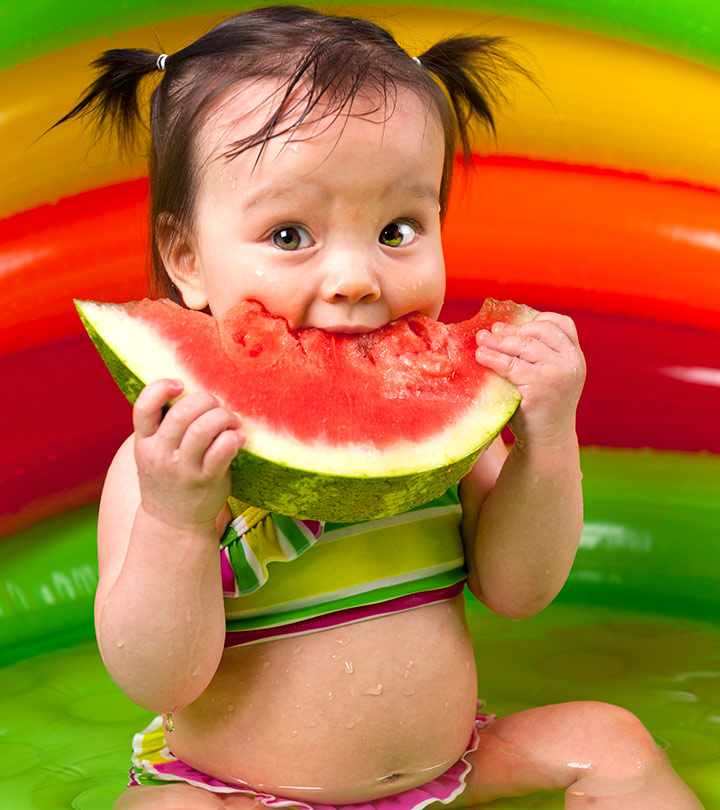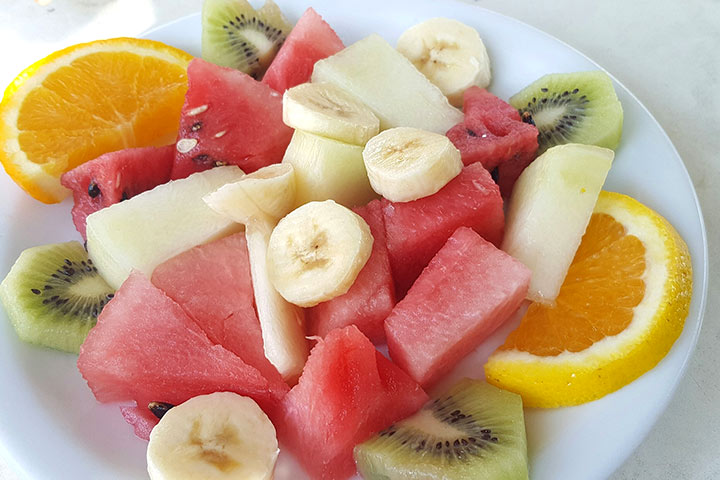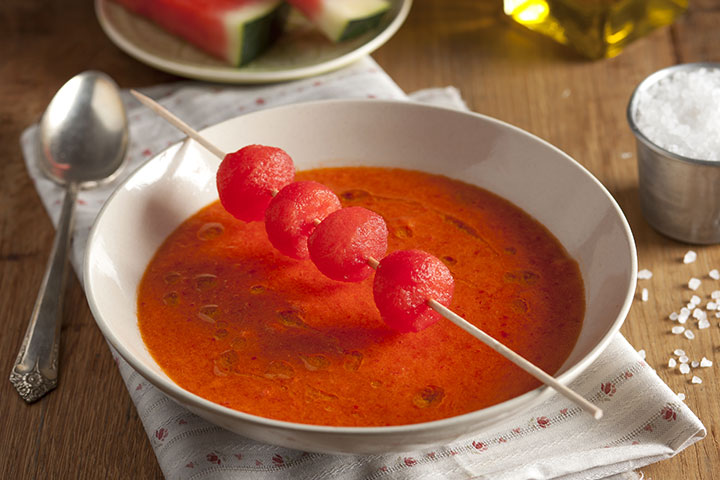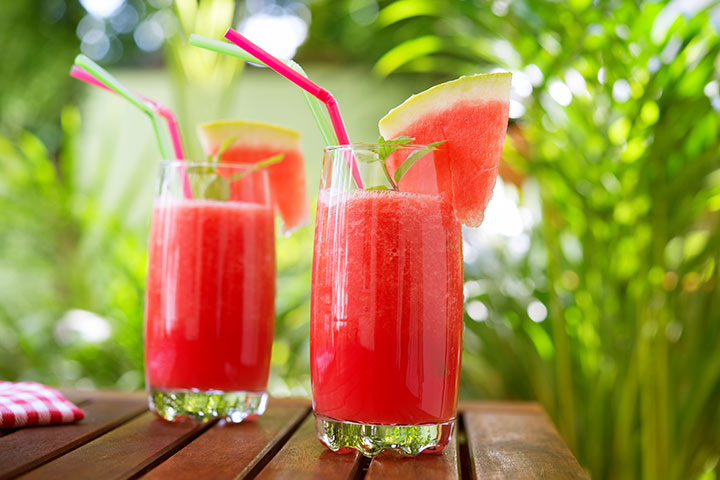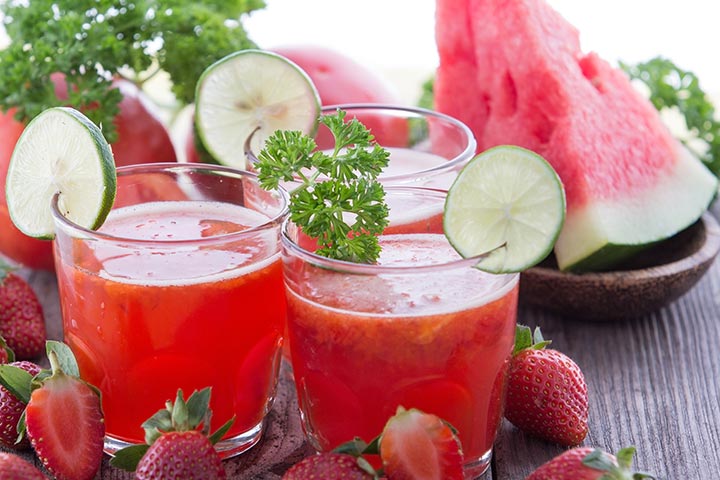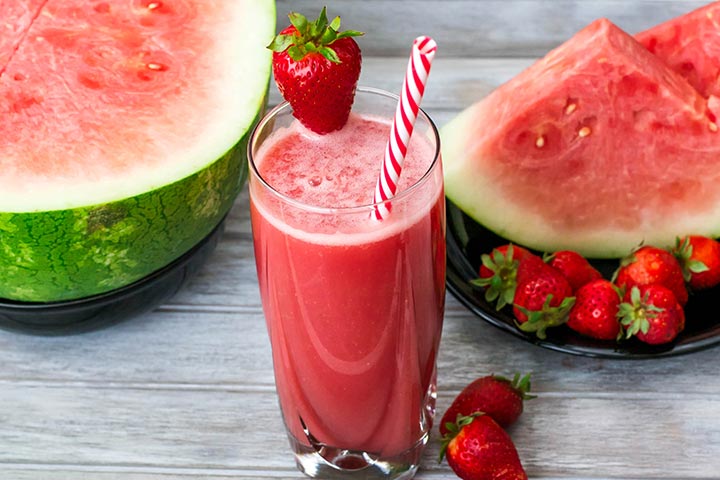Watermelon for babies is a healthy food choice rich in water, fiber, and iron. It contains 93% water and several micronutrients, including vitamin B, C, E, phosphorus, magnesium, calcium, iron, and phytochemicals that are beneficial for human health (1). Thus, adding watermelon to your baby’s well-balanced diet can contribute to their proper growth and development. But, what is the recommended age for babies to eat watermelon? Keep reading to learn more about the possible health benefits of watermelon for babies with some simple watermelon recipes you can try.
When Can Babies Eat Watermelon?
Generally, watermelon is recommended for babies from eight months of age but some parents introduce the fruit at six months itself. This can be done too, provided you stay conscious about the possible allergic reactions to watermelon.
A few sensitive babies might get rashes if they eat any type of melon due to the acidic nature of these fruits. The signs of allergy could include rashes, diarrhea, runny nose, and vomiting. At times, watermelon may lead to acidity as the fructose present in the fruit may not be entirely absorbed by the baby’s gastrointestinal system.
When it comes to infant nutrition, generalities may not apply to your baby and hence you need to consult a pediatrician before making a choice.
Nutritional Value Of Watermelon
| Here is the proximate nutritional composition of watermelon, raw (100gm) | |
|---|---|
| Water (g) | 91.45 |
| Energy (Kcal) | 30 |
| Energy (KJ) | 127 |
| Protein (g) | 0.61 |
| Total lipid (fat) (g) | 0.15 |
| Carbohydrate, by difference (g) | 7.55 |
| Fiber, total dietary (g) | 0.4 |
| Sugars (g) | 6.20 |
| Calcium (mg) | 7 |
| Iron (mg) | 0.24 |
| Magnesium (mg) | 10 |
| Phosphorus (mg) | 11 |
| Potassium (mg) | 112 |
| Sodium (mg) | 1 |
| Zinc (mg) | 0.10 |
| Fluoride (mcg) | 1.5 |
| Vitamin C (mg) | 8.1 |
| Folate (mcg) | 3 |
| Choline (mg) | 4.1 |
| Vitamin A, RAE (mcg) | 28 |
| Carotene, beta (mcg) | 303 |
| Vitamin A, IU | 569 |
| Lycopene (mcg) | 4532 |
| Phytosterols (mg) | 2 |
Source: USDA (2)
Read: Measures To Tackle Food Allergies In Babies]
Potential Health Benefits Of Watermelon For Babies
The nutrients in watermelon can benefit the baby in the below ways (3).
- Maintains water balance: The fruit helps in providing proper hydration to the body as it has 93% water and 7% flesh. It prevents dehydration, especially during summers. The electrolytes, sodium and potassium, help in reducing the chances of getting a heat stroke.
- Good for heart: Antioxidant lycopene, which is good for the heart, increases in the fruit as it ripens. Watermelons are also rich in carotenoids like neurosporene, lutein, phytofluene, phytoene, and beta-carotene. Carotenoids help in keeping the vision intact and maintaining cardiovascular health.
- Boosts immune system: Vitamin C helps in fighting infections, strengthens the immune system, and supports iron absorption.
- Improves eyesight: Vitamin A supports in strengthening the little one’s eyesight, teeth, and mucus membrane.
- Bone development: Watermelon also contains calcium and manganese which help in the development of bones. Calcium is essential for hormone secretion, and magnesium helps in building muscle and nerve function in babies.
- Vitamin B complex: Vitamin B complex is a cluster of vitamins that assist in red blood cells production, development of the nervous system, strengthening the immune system, brain function, and regulation of carbohydrate metabolism.
- Aids in digestion: Watermelon is not only a delicious summer fruit but also an easy to digest one. It is rich in dietary fiber, which helps in keeping the digestive tract healthy, preventing constipation, and irregular bowel movements.
If you are planning to add watermelon to your baby’s diet, you would want to choose the best quality fruit for them. We cover that in the next section.
How To Select Watermelon?
Melons do not fall in the list of the ‘dirty dozen foods’ of pesticide contamination. You may choose an organic or a regular watermelon. But keep these things in mind while selecting one:
- A fully grown watermelon is heavier. It should look smooth and a little dull on the top.
- You can know if it is ripe by giving a good thump with your finger. A ripe watermelon should sound hollow when tapped.
- Check for cuts, bruises, sagging depressions and spots, which indicate rotten or over ripened fruit.
- In a fully ripened watermelon, the ground spot or underbelly turns yellow or creamy. Farmfresh watermelons are extra crunchy, and juicy.
- Do not buy frozen or canned watermelon. Avoid buying pre-cut watermelons for babies as they have a high risk of contamination.
How To Store And Feed Watermelon To Babies?
- Wash the fruit under running water.
- Store it in a clean, dry place if not cut. According to the US Department of Agriculture, the lycopene and beta-carotene levels in watermelon rise when they are stored uncut at room temperature.
- Cut the fruit into small pieces, remove the seeds, and then feed these seedless watermelons to your little one.
- Store the cut watermelon in the refrigerator in an air-tight container or wrap it with a food grade plastic over the side that has been cut to ensure the fruit retains its soft texture. Refrigerate the cut melon for not more than 24 hours, if using it for your baby.
- Bring the refrigerated melon to room temperature before serving it to your baby, to prevent a cold.
If your baby is unable to eat the tiny solid watermelon pieces, try mashing them up a little.
You can mix melons with foods such as bananas, carrots, avocado, peaches, blueberries, chicken, yogurt, etc.
Caution: Watermelon is full of seeds that increase the choking risk. Remove all the seeds before giving the fruit to your baby. Feed the baby only when they sit in an upright position.
Can Babies Be Allergic To Watermelon?
While it’s uncommon for babies to have a true watermelon allergy, some may experience allergic reactions due to oral allergy syndrome (OAS). Individuals with existing ragweed and pollen allergies often may develop an allergy to watermelon. The proteins in raw watermelon are similar to those found in pollens and ragweed. Therefore, a pediatrician must diagnose potential allergies in babies. Treatment approaches align with those for adults (4). If you are introducing watermelon to your baby, follow a ‘three-day wait rule’ to rule out sensitivity, intolerance, or allergy caused by watermelon. In case of an allergic reaction, seek prompt medical guidance.
Watermelon Recipes For Babies
Here are more ways to offer watermelon to your baby. Try these simple watermelon recipes to provide refreshing fruit treats to your little one.
1. Watermelon Puree
Preparation time: 10 minutes
You will need:
- 1 watermelon (cut, de-seeded)
How to:
- Place the slices in a blender and make a watermelon puree for baby.
- If you would like, add any other food or cereal to thicken it up.
By adding in other pureed fruits to the watermelon puree, you may expose your baby to different flavors. Other fruit purees that go well with the watermelon puree include avocado, banana, or mango.
Note: Do not freeze melon puree. The frozen watermelon puree gives a thawed product that could be tasteless and gritty and not suitable for weaning.
2. Watermelon Salad
Preparation time: 15 minutes
You will need:
- 1 small banana (sliced)
- 1 small peach (diced)
- 1/2 cup watermelon (cubes)
How to:
- Mix all the fruits in a bowl and mash a little to serve as finger food.
Note: You may mix yogurt to the fruit salad.
3. Watermelon Soup
Preparation time: 15 minutes
You will need:
- 1/4 cup apple juice (unsweetened)
- 1tbsp natural yogurt
- 1/4 cup vegetable stock
- 1/2 cup watermelon
How to:
- Combine all the ingredients in a blender and sprinkle a pinch of cinnamon if desired.
4. Watermelon Juice
Preparation time: 10 minutes
You will need:
- 1 cup sweet watermelon (cut and de-seeded)
How to:
- Puree the watermelon slices in a blender.
- Strain the juice and squeeze the flesh
- Feed the extracted juice to your baby.
5. Berry Melon Punch
Preparation time: 15 minutes
You will need:
- 1 cup watermelon (diced, de-seeded)
- 1tsp lemon juice
- 2 strawberries (chopped)
- 1tbsp sugar syrup
How to:
- Mix all the ingredients in a food processor by adding enough water. Add sugar as per your taste since watermelon already contains natural sugar.
6. Watermelon Smoothie
Preparation time: 15 minutes
You will need:
- 1 cup chilled, chopped watermelon
- 1/2 cup banana slices
- 2tbsp coconut milk
- 1tbsp vanilla ice cream
How to:
- Add all the ingredients to a juicer and mix to make a soft smoothie.
Watermelon, a summer fruit, is packed with water and many other micronutrients and minerals. Therefore, watermelon for babies is indeed a healthy choice. Proper cutting and storage of watermelon are important to prevent any food infections. Some babies may be allergic to watermelon. If you notice any allergic symptoms such as rashes or other gastrointestinal symptoms in your baby after watermelon consumption, you must consult a healthcare professional. You can try many different and interesting watermelon recipes to bring versatility to your baby’s diet.
Key Pointers
- Giving watermelon to babies can help in their adequate growth and development.
- Feeding watermelons helps babies to stay hydrated, boosts their digestive and immune systems, and improves their eyesight.
- Ideally, parents can introduce watermelons to their baby by eight months.
- It is important to feed freshly cut, deseeded, and organic watermelons to infants.
- Different ways to feed watermelon to babies include juices, salads, or smoothies.
Discover how to prepare a nourishing watermelon puree for babies (6 months+) that is delicious, immune-boosting, and perfect for summer.
